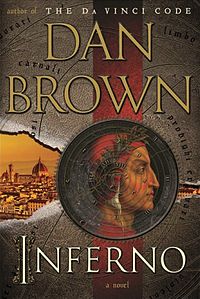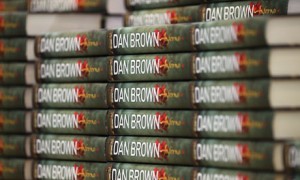 The Matrix Syndrome. I propose that as both the name for Dan Brown’s next Robert Langdon thriller and as the condition he now writes under. Or with. Or is expressing symptoms of. Not that it’s hurting his sales or his celebrity, of course. Or, as many would have it, his infamy.
The Matrix Syndrome. I propose that as both the name for Dan Brown’s next Robert Langdon thriller and as the condition he now writes under. Or with. Or is expressing symptoms of. Not that it’s hurting his sales or his celebrity, of course. Or, as many would have it, his infamy.
Remember how the first Matrix so wowed us to such a degree that the second and third paled in comparison? That’s how it is for Brown now, I think: everything he does falls under the long shadow of (the success of) The Da Vinci Code, which, much like Foucault’s Pendulum, trod and retrod that fun old Holy Blood, Holy Grail territory. However, unlike the Eco, Dan Brown’s novel was actually engaging. And it took over the world every bit as much as Harry Potter, as Fifty Shades. Maybe even more, in that it became a point for people to argue, and take ideological sides over. And that it was built like a hybrid of a crossword and chutes & ladders definitely didn’t hurt, as that allowed it to showcase the frenetic pacing Brown does as well anybody, and had already been doing for a few books.
All his work, it’s got that same pacing, those same sudden reversals, the betrayals, the twists and turns and little hidden lectures, the showing-off of obscure, kind of intrinsically cool facts, but none of those other books have sparked our imagination as much as Da Vinci Code, right? Neither did Matrix 2 or 3 reel in the same box office haul as the original, in spite of the fact that they were traversing the same conceptual spaces, and with stunt and effects money to burn.
What we wanted, as with Da Vinci Code, was for the carpet to get just completely pulled out from under us.
And, no, Inferno doesn’t do that, quite. There’s only so many carpets, I mean.
Still, and in spite of all the good-natured and/or mean-spirited fun people like to make of Brown’s prose—he’s no worse than a lot of others, he’s just a much bigger target—Inferno’s a good time, a fun read. And it knows the genre it lives and breathes in. It knows it very very well. I mean, it even seems to be pulling in a version of Clive Cussler’s Juan Cabrillo, and Robert Langdon’s pretty much an ivory-tower Jack Reacher. And of course, like every Brown outing, there’s a Bond girl, and there’s exotic settings that feel just thoroughly researched. Like, the kind of research that the spy-novel set would appreciate (they’re the kind who go to the assassin’s balcony to see if that shot was actually possible. and then they take windage readings). And, more importantly, the action in Inferno, it never stops. Were Dan Brown a dungeonmaster, I’d want to play in a campaign he designed: there’s no boring rooms. And, granted, anytime you have to fall back on amnesia to make the plot work, you’re showing your band-aids, but at least Brown hits us with that nearly immediately, such that, if we can swallow the amnesia, the rest goes down fairly easily.
My only hesitation? There’s a few times—three I can recall, without paging back through—he delivers backstory in flashback form, sometimes even using those justly-maligned italics. Which, finally, is fine; that’s part of fiction, and sometimes you’ve got to do it, no matter how much it makes you cringe. But the way he does it this time is via embedding first-person in a third-person game. It comes off a touch awkward, a bit forced, kind of like the first thing you think of, instead of the sixth or seventh. However, remember when N. Scott Momaday did the same thing in House Made of Dawn, delivering backstory in second person? It absolutely sung, there (and, I would argue, was pretty much the only memorable thing from the book). So, I’m not so sure why it would succeed in one book, and kind of fail in another. And it’s not a quality-of-prose thing. I think it’s a tone-thing. Either way, clocking it did serve to heighten my sensitivity to it in my own work, so, you know: thanks, Dan Brown. I might have tried a Momaday, otherwise.
 And, those people who make fun of his prose, of his writing, first, what does he care, he could probably match the pot in a poker game with Rowling and Meyer, and, second, you’re not completely wrong, to level those kind of sweeping accusations (though I so, so hope you’re actually reading, not just sampling). But, pick a writer, and we could all make good and proper fun of him or her, right? We’ve all got our tics; we all sit down where there isn’t a chair sometimes, and hope nobody notices.
And, those people who make fun of his prose, of his writing, first, what does he care, he could probably match the pot in a poker game with Rowling and Meyer, and, second, you’re not completely wrong, to level those kind of sweeping accusations (though I so, so hope you’re actually reading, not just sampling). But, pick a writer, and we could all make good and proper fun of him or her, right? We’ve all got our tics; we all sit down where there isn’t a chair sometimes, and hope nobody notices.
As for Brown in particular, the only glaring kind of weakness to the writing I see, it’s that when his characters are left alone with their thoughts, things get dicey fast. When he’s in the thick of the action, however, man, his writing’s right in step, and solid. Leave a dude sitting in a plane for a long ride, though, where Brown feels compelled to deliver exposition via that character’s chain of thought, and some awkwardness tends to creep in. Specifically, in the way he balances direct- and indirect discourse: the rhythm gets to be too predictable. We recognize the beats, and, when that happens, our eyes start trying to skip ahead to the conclusion, which of course leaves us kind of hostile and resistant to all this stuff in the way of those conclusions. Conclusions which, granted, we both need and that should be delivered in something like this manner. But still.
The reason this happens in Brown’s writing, I suspect, is that each of those scenes were initially longer, and he’s gone through like we all do, burned and pared and culled and winnowed and sacrificed, trying to deliver us just the facts. But, in doing so, the scene’s left feeling a touch staged, the character a bit like a mouthpiece.
And, I completely suspect Brown is aware of this, and, because he knows he’s most comfortable with the heightened, improbable action—with making that thrilling, as a thriller writer should—he tries to keep the story dialed to exactly there every chance he gets. Which, in turn, kind of sorethumbs those down moments, makes them all that much more weighty . . .
But, we all try to play to our strengths, don’t we? Or hide our faults, anyway. Trick is, Dan Brown’s got everybody watching his every keystroke. That’s got to be nerve-wracking. And kind of cool.
Anyway, a few weeks ago I heard Salman Rushdie speak. He’s no fan of Dan Brown, but he wasn’t talking about Dan Brown this time, either. He was talking about how novels, when they’re really working, can be used to transmit ideas. Or, I’m sure I’m unfairly reducing what he said—he was more elegant than ‘transmit,’ I’m sure, and probably more cagey than ‘ideas’—but that was my takeaway. And of course he trotted out the usual examples (Moby Dick, EM Forster), and then got as contemporary as Adam Johnson’s The Orphan Master’s Son, saying it was telling us about North Korea, it was opening up a whole new world. And I don’t disagree, not even a little: fiction can and does do this, and good fiction does this better than not-good fiction. Thank you so much for articulating it so well.
But, reading Inferno, which deals largely with overpopulation, I got to thinking about Jonathan Franzen’s Freedom, which maybe doesn’t hinge on overpopulation, but does address it just over and over, anyway, even getting a little shrieky with it. And, while it’s hard to argue that Franzen isn’t a pinball wizard with prose, and with scenes, and with manipulating a narrative—dude’s absolutely in control, on the page—still, I didn’t come away from Freedom all that concerned with overpopulation. Inferno, though, yeah, definitely; I’m way paranoider now than I was before (my big plan? invent a shrink ray, set it to reverse, and aim it at the planet. or, don’t reverse it, aim it all of us), and, though I talk about overpopulation to students all the time, as regards zombies and why we need those stories . . . I don’t know. I think I’m going to push that even more, now. Thanks to Inferno.
 And I think that’s Brown’s talent, his gift: he dramatizes ideas in a way that somehow lowers our critical defenses, such that the idea can skate right across. As with Da Vinci Code. That’s how Inferno was for me. How it is: an issue set to slightly annoying pop music, such that, in resisting the instruments, I accidentally absorb the lyrics. But Brown’s not doing this in the ridiculous way Crichton was at the end of his career, where his books were reading more like thinly-dramatized, slightly hysterical sermons. No, Dan Brown never forgets that this has to be fun,
And I think that’s Brown’s talent, his gift: he dramatizes ideas in a way that somehow lowers our critical defenses, such that the idea can skate right across. As with Da Vinci Code. That’s how Inferno was for me. How it is: an issue set to slightly annoying pop music, such that, in resisting the instruments, I accidentally absorb the lyrics. But Brown’s not doing this in the ridiculous way Crichton was at the end of his career, where his books were reading more like thinly-dramatized, slightly hysterical sermons. No, Dan Brown never forgets that this has to be fun, too first. Improbable, sure, of course, that’s part of the game. I mean, I remember in one of the Clive Cusslers, Juan Cabrillo, lost in a desert, somehow plastic-welds his prosthetic leg to a lid and windsails to safety. Just as Robert Langdon used his faithful Harris Tweed jacket to parachute down over the Vatican. That kind of ridiculousness is built into the genre. It’s why we buy those books: to ‘experience’ things we wouldn’t otherwise experience.
So, no, Inferno isn’t going to dominate every discussion for the next year, the way Da Vinci Code did. The way The Matrix did. But, the next time Robert Langdon answers that call to adventure, I’ll be there at midnight again, to buy it. After Angels & Demons, I spent a solid two weeks of eight- and ten-hour days designing ambigrams, pretty suspicious that was maybe my true calling. And then after The Lost Symbol, I was seeing that little hydrogen symbol everywhere—even on Dr. Manhattan. And now I’m anxious for the next one, for Dan Brown to sensitize me to something else, to send me down some path I hadn’t considered. It’s why I read.

 is the NYT bestselling author of 30 or so books, +350 stories, some comic books, and all this stuff here. He lives in Boulder, Colorado, and has a few broken-down old trucks, one PhD, and way too many boots. More
is the NYT bestselling author of 30 or so books, +350 stories, some comic books, and all this stuff here. He lives in Boulder, Colorado, and has a few broken-down old trucks, one PhD, and way too many boots. More